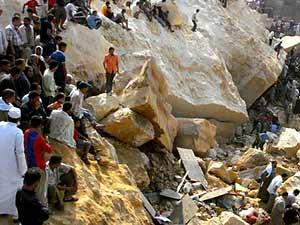 LITTLE has changed in Egypt to move the poor from unsafe places and prevent a repetition of a rockslide in a Cairo shantytown that killed more than 100 people last year, Amnesty International said in a report yesterday.The London-based rights group also criticised the Government for resettling families far from places of work and with- out consultation, often in the presence of security services
LITTLE has changed in Egypt to move the poor from unsafe places and prevent a repetition of a rockslide in a Cairo shantytown that killed more than 100 people last year, Amnesty International said in a report yesterday.The London-based rights group also criticised the Government for resettling families far from places of work and with- out consultation, often in the presence of security services
Thousands of Egypt's poor are trapped by poverty and neglect that could ulti- mately end in their deaths," said Malcolm Smart, Amnesty International's Middle East and North Africa director. "The Government must urgently address the risks faced by those living in areas designated as `unsafe' and find solutions by consulting with those directly affected.""Egypt's poor should not have to live any longer with the threat of being buried alive," he added. The rockslide in September 2008 killed more than 100 people when huge boulders crushed their ramshackle dwellings in Doweiqa on Cairo's eastern outskirts. Residents at the time estimated up to 600 bodies were not recovered."The tragedy in el-Doweiqa (Doweiqa) was a disaster waiting to happen.And that was well-known," Smart said, citing gov- ernment studies after a nearby rockfall in 1993.While the Government launched an investigation immediately after last year's rockslide, no findings have yet been announced, Amnesty said.Amnesty said authorities later identified other dangerous areas and demolished more than 1,000 threatened homes, rehousing more than 1,750 families with- in a month.But the rights group said residents were liable to eviction, and the allocation of new housing discriminated against women who were divorced or living apart from their husbands."Slum dwellers describe a life charac- terised by deprivation, neglect, insecurity and the constant threat of forcible eviction," Smart was quoted by Reuters as saying."The state must guarantee their right to adequate housing and put an end to forced evictions."



